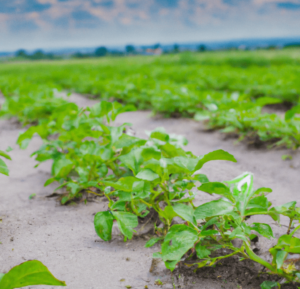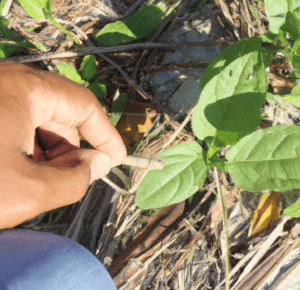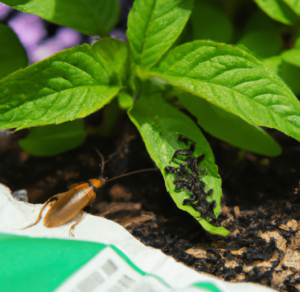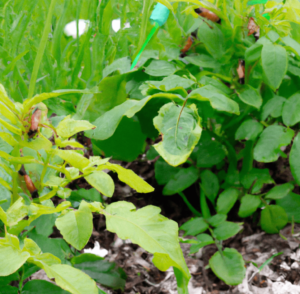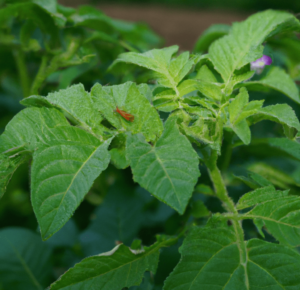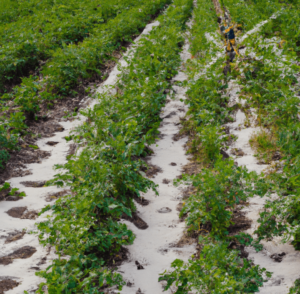Chemicals have been essential to contemporary agriculture because they shield crops from pests and illnesses, boost yields, and guarantee food security for a population that is expanding worldwide. However, due to their widespread use, questions have also been raised regarding their effects on the environment, human health, and the long-term viability of agriculture. Let’s talk about the role of chemical pesticides in modern agriculture.
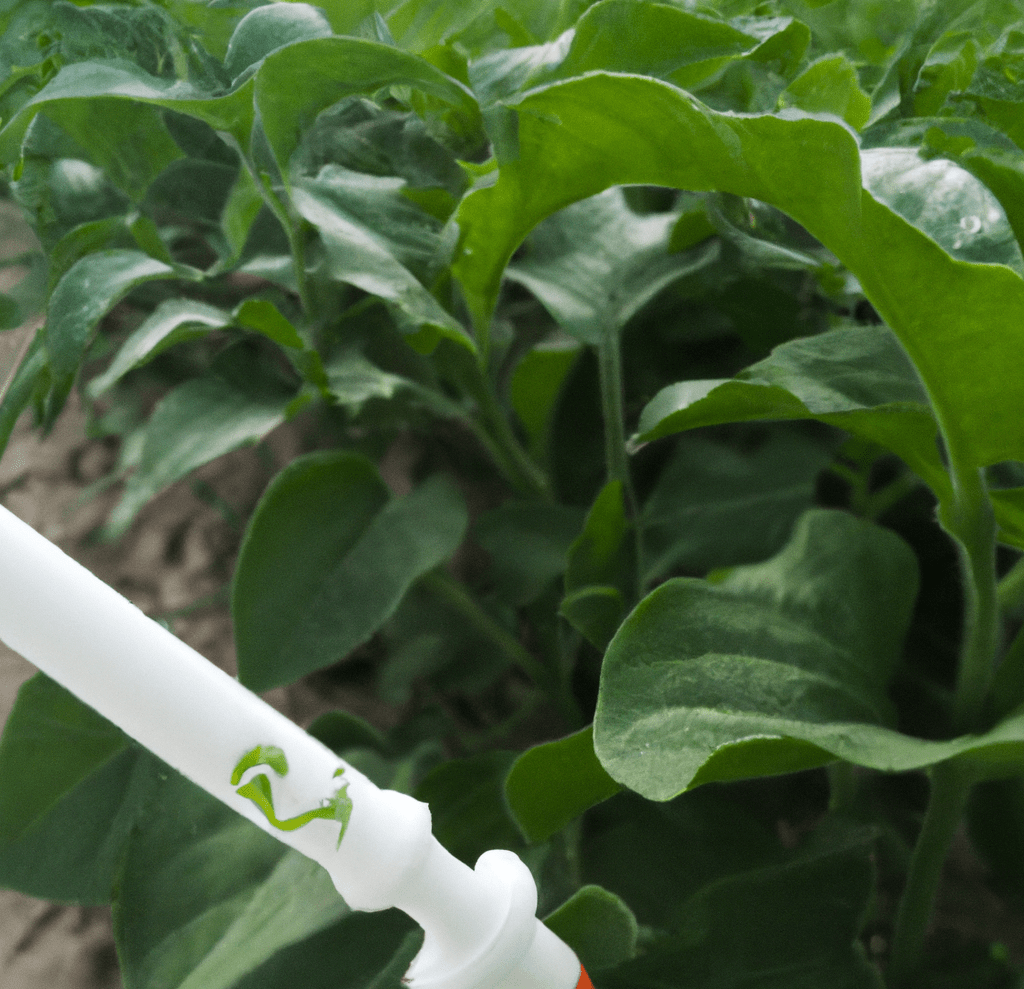
The History of Chemical Pesticides
Since the time of the ancient Chinese, Greek, and Roman civilizations, pesticides have been employed in agriculture. However, synthetic chemical pesticides did not become widely accessible and economical until the middle of the 20th century, altering contemporary agriculture. After World War II, when many of the same chemicals used for military use were repurposed for agricultural use, the usage of chemical pesticides increased significantly. The role of chemical pesticides in modern agriculture has since developed into a crucial tool for farmers all over the world, assisting in boosting agricultural yields and safeguarding crops against pests and illnesses.
How Chemical Pesticides Work
Crops are shielded from weeds, illnesses, and pests by chemical pesticides. They cause the pests to die by interfering with their nervous system, metabolism, or reproductive system. Chemical pesticides can impact water, food, human health, and the environment, though, when they are used. Chemical pesticides can contaminate neighboring water sources when they are used on crops. As a result, rivers, streams, and groundwater may become contaminated, endangering aquatic life and making the water unfit for human consumption.
Food that is taken from crops that have been treated with chemical pesticides may also include residues. Health risks from these residues can arise, particularly if food is not thoroughly cooked or rinsed before eating. Chemical pesticides have been connected to a number of health difficulties, such as cancer, complications during pregnancy, and neurological abnormalities. Chemical pesticides not only have an adverse effect on human health but also on the ecosystem.
The role of chemical pesticides in modern agriculture has the power to destroy ecosystems and kill helpful insects like pollinators. Additionally, overusing chemical pesticides might result in the creation of pests that are resistant to them, which could cause even more severe harm to crops. The use of chemical pesticides should be carefully considered in light of these possible hazards, and safer options for managing pests should be investigated as well.
Different Types of Chemical Pesticides
In agriculture, chemical pesticides are frequently used to manage weeds, illnesses, and pests. On the other hand, they might have detrimental effects on agricultural practices, water quality, and human health. The role of chemical pesticides in modern agriculture differs based on the type that they are:
- Insecticides are used to eradicate pest insects that harm crops. Additionally, they can affect pollinating insects like bees and butterflies as well as other helpful insects. If consumed or inhaled, insecticides can potentially be dangerous to people.
- Using herbicides in gardening, weeds that compete with crops for nutrients and water can be eliminated. They may harm non-target plants and contaminate the soil and water. Additionally harmful to human health, herbicides can cause cancer and birth problems.
- Fungicides are used to combat fungi that cause crop illnesses. They can contaminate soil and water and destroy the beneficial fungus. Additionally harmful to human health, fungicides can cause skin rashes and respiratory issues.
- Rodenticides are used to get rid of rats that spread disease and harm crops. When non-target animals eat poisoned rats, they may suffer consequences. When consumed or inhaled, rodenticides can potentially be harmful to people’s health.
- Chemical pesticides can have negative impacts on both human health and the environment. They can also breed pests that are resistant to pesticides, which can make pesticide treatments less effective. This can result in the usage of more pesticides, which would worsen the effects.
The Mode of Action of Pesticides on Targeted Pests
The role of chemical pesticides in modern agriculture is to manage, ward off, or eliminate pests that threaten crops and livestock. The target pest, formulation, and chemical structure of pesticides all affect how they work. However, the purpose of applying pesticides is to lessen crop damage and boost yields. Pesticides can affect pests in a number of ways, such as by interfering with their nervous system, stunting their growth, and removing their protective outer coat. These modes of action might change based on the kind of pesticide being used and are typically targeted at particular pests.
While helpful in reducing pest populations, pesticides can also be dangerous to people, the environment, and unintended organisms. Inappropriate pesticide use and application can contaminate food, water, and soil, which may pose health risks. Therefore, it is crucial to use pesticides appropriately and adhere to all label directions, particularly those about correct handling, storage, and disposal. In order to decrease the use of chemicals and lessen their negative effects on the environment, it is necessary to employ integrated pest management (IPM) tactics, which combine the use of pesticides with other pest control techniques.
The Benefits of Using Chemical Pesticides in Agriculture
The role of chemical pesticides in modern agriculture can be beneficial because:
- Chemical pesticides help preserve water and food supplies by reducing the number of pests and diseases that can harm crops. Chemical pesticides assist maintain a steady supply of food by reducing crop loss, which also lowers the demand for extra resources to cultivate more crops.
- Chemical pesticides can benefit human health by lowering the prevalence of illnesses that are transmitted through crops. Pesticides aid in decreasing the spread of fungi and insects that transfer infectious diseases by killing them.
- Chemical pesticides can be made to target certain organisms, which helps lessen the impact on organisms that are not the intended targets. They can also be designed to be less toxic, lowering the possibility of injury to both people and the environment.
- By lowering crop losses and enabling higher yields, chemical pesticides enhance agribusiness processes. Farmers experience higher production and revenues as a result, which helps sustain rural economies.
Chemical pesticides have some drawbacks, but when used properly, they can have a positive impact on the environment, human health, food sources, and water quality. We can continue to profit from chemical pesticides in agriculture while lowering the dangers to both people and the environment by working to produce safer and more effective formulations.
Increased Crop Yields and Crop Protection
Techniques used in agriculture are essential for boosting crop yields and protecting them, which has a big impact on both people’s health and the availability of water resources. Precision agriculture is a crucial method that involves gathering information about crop health and soil conditions using gadgets like sensors and drones. With the help of this knowledge, irrigation, and fertilizer applications can be made to produce greater yields while using less water.
The role of chemical pesticides in modern agriculture including crops that have been genetically modified to be resistant to pests and illnesses is another tactic. This may lessen the need for chemical pesticides and herbicides, which would have an adverse effect on the environment and human health. Agricultural rotation, cover crops, and conservation tillage are further techniques that can help preserve soil quality and lessen erosion, resulting in increased crop yields over time.
Reduced Economic Losses Due to Pest Damage
Pests have the potential to seriously harm crops, causing farmers to lose money and possibly decreasing human access to food and water. Using insecticides to lessen the impact of pest damage on agricultural crops has proven to be a successful technique, leading to higher yields and lower financial losses. Insect, weed, and fungal pests can all be controlled with the role of chemical pesticides in modern agriculture.
They can be sprayed from the air, directly applied to the crops through the soil or water, or both. By enhancing crop quality and lowering the danger of pest-caused crop damage, pesticides can increase crop productivity. It has been demonstrated that using pesticides can cut down on the financial losses brought on by pests in agriculture. Pesticides assist in defending crops against pests, which can boost yields and lower the possibility of crop failure.
As a result, food prices may be stabilized and a sufficient supply of food and water for people may be guaranteed. Despite the fact that using pesticides has many advantages, it is crucial to use them properly to reduce any potential negative effects on both human health and the environment. Prudent management techniques, such as the selection and administration of pesticides in the right amounts, can assist to lower the hazards involved in their use.
Improved Food Safety and Quality
Consumers and authorities share a common concern: improving food quality and safety. Numerous health issues in humans, including cancer and neurological diseases, have been connected to the use of pesticides in agricultural agriculture. There is thus an increase in demand for safer and healthier dietary options. Many farmers are using alternative pest control strategies including integrated pest management (IPM) and organic farming to solve these issues.
IPM employs a variety of methods, including targeted pesticide application, crop rotation, and biological management, to reduce the impact of pests on crops while using fewer pesticides. Additionally, technological advancements have made it possible for farmers to better oversee and manage every aspect of production, from soil management to harvesting and storage. Food quality and safety have improved as a result, while productivity and efficiency have also grown.
Last but not least, due to the role of chemical pesticides in modern agriculture, regulatory organizations are becoming more crucial in safeguarding the security and caliber of food goods. They establish and uphold regulations governing the use of pesticides as well as the inspection, labeling, and testing of food products. This guarantees that consumers have access to correct information about the food they are buying and protects them from hazardous ingredients.
The Drawbacks and Risks of Using Chemical Pesticides
The role of chemical pesticides in modern agriculture and their effect on human health is a big worry, as exposure to these chemicals can result in a number of health issues, including cancer, birth defects, and neurological diseases.
Chemical pesticides can also pollute soil and water, harming both the ecosystem and unintended organisms in addition to the target species. This has the potential to upset the biological balance and harm ecosystems over the long term. Additionally, overusing chemical pesticides might cause pests to become resistant, making these methods less effective over time. Additionally, this may lead to the requirement for more potent and hazardous chemicals, raising the dangers to both people and the environment.
An increasing push towards more environmentally friendly and sustainable farming methods that minimize or do away with the use of chemical pesticides has emerged in response to these problems. Crop rotation, the utilization of natural insect predators, and the use of organic and biological pesticides that are less damaging to people and the environment are some of the alternative strategies.
Environmental Risks, Such As Contamination of Soil and Water
Environmental dangers associated with agriculture and pesticide use can include soil and water contamination. In addition to harming pests, pesticides used in agriculture can also affect people, animals, and the environment. When these substances are used on crops, the soil may absorb them, causing contamination of nearby groundwater or surface water sources. The ecosystem and human health may both be seriously harmed by this contamination.
Numerous health issues, such as cancer, brain impairment, and gastrointestinal disorders, can be brought on by contaminated water sources. Additionally, polluted food poses a risk to humans and other animals who consume it since contaminated soil can result in food contamination. It’s crucial that agricultural practices prioritize the sustainable and appropriate use of pesticides in order to reduce these dangers despite the role of chemical pesticides in modern agriculture. In order to achieve this, pesticide use and application must be closely monitored. Only the safest and most efficient products should be chosen and used, and whenever practical, alternative pest management strategies should be used. The agriculture sector can contribute to environmental and public health protection by taking measures to reduce environmental risks.
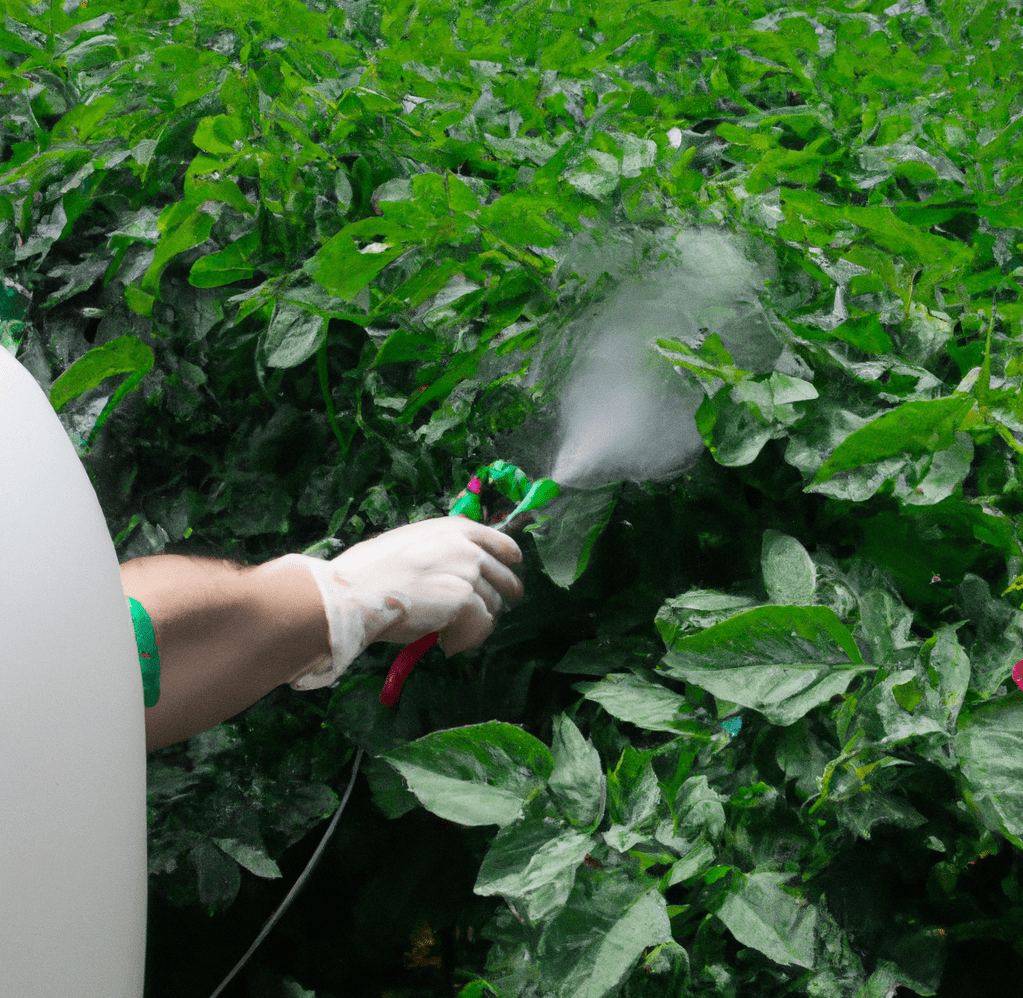
Effects on Non-target Organisms, Such As Beneficial Insects and Pollinators
The role of chemical pesticides in modern agriculture and their use may harm organisms that are not their intended targets, such as beneficial insects and pollinators. Unintentional harm to natural enemies that could aid in the control of crop pests may result from pesticides that do not distinguish between dangerous and beneficial insects.
Additionally, pollinators, which are crucial to the growth of many crops, can be adversely affected by pesticides. Pesticides can have long-lasting, extensive effects on organisms that are not their intended targets, potentially affecting entire ecosystems. For instance, it has been demonstrated that widespread use of neonicotinoid insecticides is associated with honeybee population decreases, which could have detrimental effects on the pollination of agricultural crops and the general health of the ecosystem.
When deciding whether to use pesticides in agriculture, it’s vital to take into account any possible effects on organisms that are not their intended targets. While it is impossible to overlook the advantages of pesticide use for agricultural productivity and human health, precautions should be made to reduce their adverse effects on the environment and other species, especially those that do not directly impact on humans.
Risks to Human Health, Such As Exposure to Toxic Chemicals
The role of chemical pesticides in modern agriculture can cause serious health concerns to people. From acute poisoning to long-term chronic ailments, exposure to hazardous substances through food, drink, and air can have a negative impact on one’s health in a number of ways.
Particularly susceptible to exposure to harmful substances are farm workers and people who live close to agricultural fields. Pesticides can drift from fields and contaminate surrounding residences and towns, causing a variety of health difficulties, including cancer, neurological impairment, and respiratory problems. A multifaceted strategy is needed to reduce the dangers to human health from contact with harmful chemicals used in agricultural techniques.
This could entail switching to alternate pest control methods like integrated pest management, using fewer pesticides, and implementing more environmentally friendly agriculture methods. In addition, tighter controls and monitoring of pesticide use can reduce environmental and human health concerns.
Current and Emerging Alternatives to Chemical Pesticides
Chemical pesticides have been used extensively to protect crops from pests, but the role of chemical pesticides in modern agriculture has detrimental effects on both human health and the environment. To lessen the dependency on chemical pesticides, alternative pest control techniques are being created and utilized.
Water management is one viable option. An environment that is less conducive to insect growth can be created with the help of effective irrigation and drainage. This approach improves water conservation while decreasing the demand for chemical pesticides. A different option is biological control, which entails using pests as prey for natural enemies like predators or parasitoids. This approach works well, is secure for people, and causes no harm to the environment.
Additionally, pest-resistant crops are being developed using genetic engineering and biotechnology. With these crops, chemical pesticides are not as necessary, and food production may be done sustainably.
Biological Pest Control Methods
Biological pest management techniques involve managing pests in agriculture by using living things or natural goods. Due to its potential advantages for the environment and human health, such as a decrease in the use of synthetic pesticides and an improvement in water quality, this strategy has grown in popularity in recent years.
Utilizing predatory insects or animals, such as ladybugs or birds, to eliminate pests like aphids or rats is one of the biological pest control methods that can replace the role of chemical pesticides in modern agriculture. Utilizing microorganisms, such as bacteria or fungi, to control plant diseases or pests is another method. The employment of biological pest control techniques in agriculture can help to safeguard human health by minimizing the usage of synthetic pesticides.
By using fewer hazardous pesticides and protecting valuable ecosystems, biological pest control techniques can support sustainable agricultural practices. In the long run, these methods may also be more economical because they eliminate the need for costly and frequently dangerous synthetic pesticides.
Integrated Pest Management
The employment of numerous strategies to reduce the role of chemical pesticides in modern agriculture is emphasized in the sustainable approach to managing pests in agriculture known as integrated pest management (IPM). IPM considers how pesticides affect people, the environment, and the availability of food and water.
Cultural techniques including crop rotation, the use of disease-resistant crop types, and soil stewardship are all part of IPM programs. Additionally, biological management techniques such as introducing pest-killing diseases, parasites, or natural predators are used. Physical techniques such as trapping, screening, and fencing can also aid in preventing pest infestations. IPM practitioners use the least harmful alternative when pesticides are required and apply it in a way that reduces exposure to non-target organisms.
IPM also places a strong emphasis on monitoring pest populations to ascertain when management actions are necessary and to assess their efficacy. IPM decreases the need for pesticides, contributes to environmental protection, and upholds a high standard of food and water safety by integrating a number of pest management techniques.
Organic Farming Practices
Using natural means rather than synthetic pesticides, fertilizers, or genetically modified organisms, organic farming practices refer to an agricultural system. Due to its multiple advantages for the environment, human health, and agricultural productivity, this form of farming has grown in popularity.
Organic farming techniques focus on organic means of pest and weed control, such as crop rotation, cover crops, and natural predators. The benefits of using biodegradable pest control methods in your garden include reducing the chance that farmers, consumers, and the environment will be exposed to pesticides. Higher yields and higher-quality crops are produced as a result of organic agricultural practices, which help promote soil health. Through these techniques, soil biodiversity, water retention, and nutrient availability are increased, resulting in more nutrient-dense and flavorful crops.
Furthermore, by fostering indigenous wildlife and flora, organic agricultural techniques encourage biodiversity. This supports a robust environment that is advantageous to all living things, including Homo sapiens.
Bottom Line: The Role of Chemical Pesticides in Modern Agriculture
The role of chemical pesticides in modern agriculture has contributed significantly to crop protection in modern agriculture by increasing yields and lowering crop losses brought on by pests and diseases. However, research has shown that excessive pesticide use can harm the environment, non-target creatures, and human health.
To maintain sustainable agricultural operations, it is crucial to find a balance between the advantages and disadvantages of pesticide use. Proper laws, monitoring, and education of farmers on the proper use of pesticides are required to strike a balance between the advantages and disadvantages of pesticide use.
The creation of safer pesticides that are more target-specific and have minimal negative effects on the environment should also be prioritized. Biological control, crop rotation, and integrated pest management are a few examples of alternative pest management strategies that need to be investigated and used because they are more sustainable. While maintaining crop output and preserving the environment, these techniques can aid in reducing pesticide use.
The Role of Chemical Pesticides in Modern Agriculture FAQs
What is the role of chemical pesticides in modern agriculture?
Chemical pesticides are essential to modern agriculture because they protect crops from pests and illnesses, boost yields, and guarantee the security of food for a growing global population.
How do synthetic insecticides work?
Chemical pesticides function by killing pests by interfering with their nervous system, metabolism, or reproductive system. Chemical pesticides can, however, have detrimental impacts on the environment, human health, and water quality.
What varieties of chemical pesticides are used in agriculture?
Insecticides, herbicides, fungicides, and rodenticides are a few of the chemical pesticides used in agriculture. Each type behaves differently and has a distinct potential to harm non-target creatures as well as the environment.
What advantages do chemical pesticides in agriculture offer?
Chemical pesticides can be used in agriculture to protect water and food supplies, improve human health by halting the spread of illnesses spread through crops, and target certain species to have less of an impact on unintended targets.
What adverse effects might utilizing chemical pesticides in agriculture have?
Chemical pesticides can harm non-target creatures, contaminate water, soil, and food, and have a detrimental effect on human health when used in agriculture. Pests that are resistant to pesticides may also be created as a result of excessive pesticide use.
What health problems can result from using contaminated water?
Multiple health problems, including cancer, brain damage, and gastrointestinal ailments, can be brought on by contaminated water sources.
How can the use of pesticides in agriculture lessen the hazards to the environment?
By prioritizing the responsible and proper use of pesticides, closely monitoring pesticide usage and application, selecting only the safest and most effective products, and employing alternative pest management techniques when appropriate, the agriculture sector may lower environmental hazards.
What unforeseen effects could chemical pesticide use on non-target creatures have?
Chemical pesticides can affect non-target organisms like beneficial insects and pollinators if they are used on them. Pesticides might not be able to tell the difference between harmful and helpful insects, which could cause unintended harm to natural enemies that could manage crop pests. Pesticide use can also have a negative impact on pollinators, which are essential to the development of many crops.
What potential health risks can chemical pesticide use in agriculture bring about?
Chemical pesticide use in agriculture can have a major negative impact on people’s health, including short-term chronic illnesses and acute poisoning. One’s health may suffer as a result of exposure to dangerous substances through food, drink, and/or air in a variety of ways.
What are some insecticides that don’t contain chemicals?
Water management, biological pest control, and pest-resistant plants are alternatives to chemical pesticides. The management of water resources makes the environment less favorable for the growth of insects, whereas biological control refers to the use of living creatures or natural resources to control pests in agriculture. Genetic engineering and biotechnology are being used to create crops that can withstand pest attacks.
What’s IPM?
An environmentally friendly method of controlling pests in agriculture, integrated pest management (IPM) places a strong emphasis on using a variety of tactics to lessen the use of chemical pesticides. IPM takes into account how pesticides impact people, the environment, and access to food and water. IPM programs include cultural strategies, biological management techniques, and physical techniques. IPM specialists utilize the least destructive option to get rid of pests while causing the least amount of damage to the environment and to people’s health.


